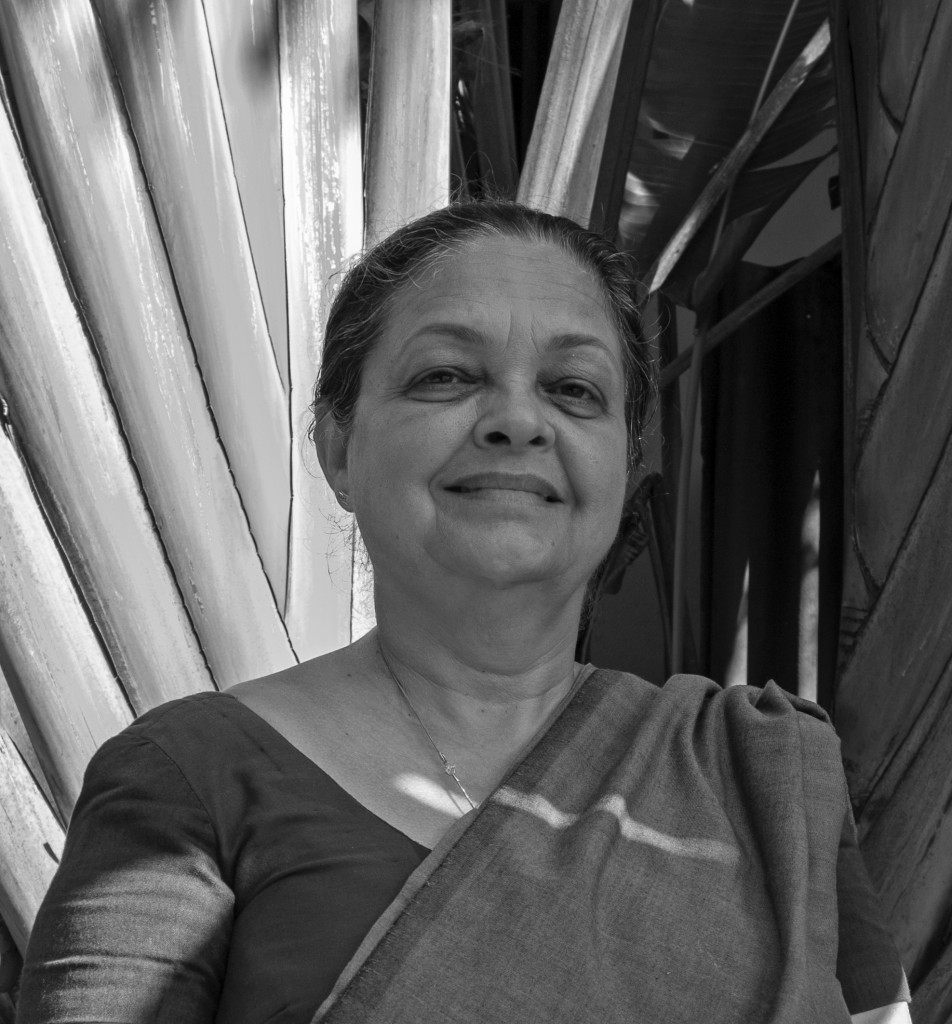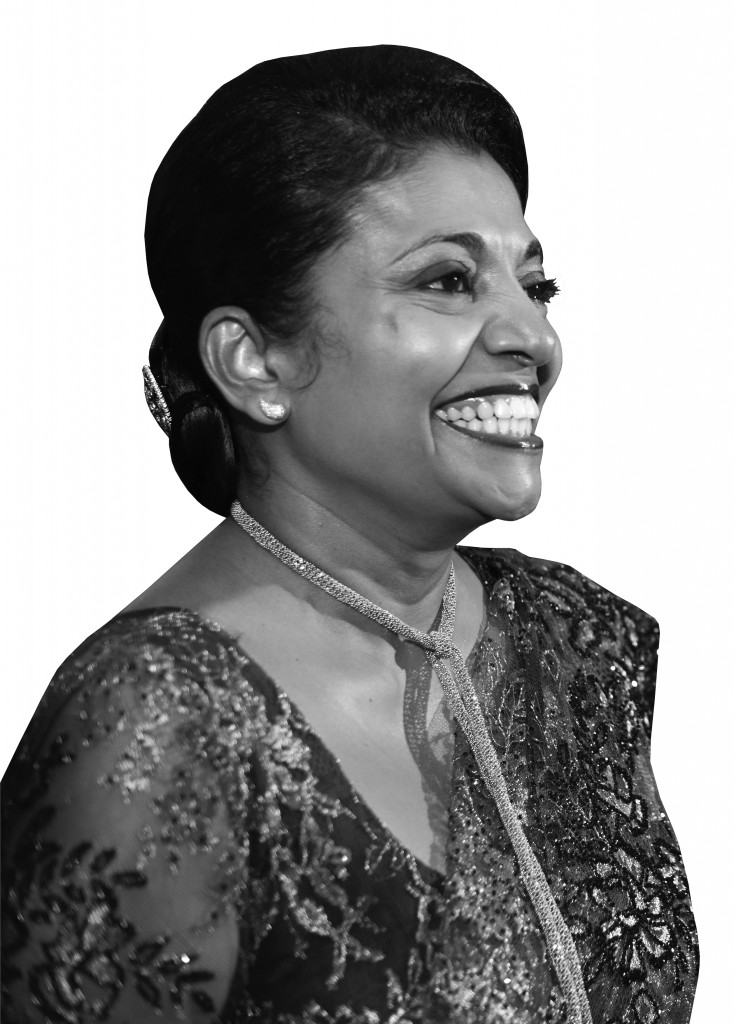#14 NILOUFER ANVERALLY
FOUNDER, Cotton Collection
 Niloufer Anverally started her readymade clothes and leather goods retail venture from her home. It’s now an established chain of high street stores with a combined square footage of over 22,000. Cotton Collection retails its own brand Coco.
Niloufer Anverally started her readymade clothes and leather goods retail venture from her home. It’s now an established chain of high street stores with a combined square footage of over 22,000. Cotton Collection retails its own brand Coco.
Retail is expected to become far more competitive as international brands enter the Sri Lankan market. The trend of depending on stock lots is already diminishing and customers are now demanding better quality. The Coco brand is designed and manufactured in Sri Lanka at Cotton Collection’s own facilities and those of its partners.
Leather Collection, Anverally’s chain of stores selling shoes, bags and leather goods is also slated for retail expansion soon.
#17 JOYCE GUNAWARDENE
DIRECTOR PROMOTIONS, JAT Holdings
JAT Holdings, which has announced that it plans to list by 2016, has been growing 35% year on year during the last three years. Joyce Gunawardene has successfully built a number of group brands in that period making it possible for the firm to capture dominating market share. It’s now entered the competitive paints market with two brands Crown and Permoglaze. JAT’s fortunes are closely tied to the construction sector, so far one of the fastest growing areas in the economy
Joyce Gunawardene says the firm’s growth strategy has four elements.
1. Introducing top brands like Crown and Permoglaze Paints
2. Expanding in to new markets like India and Seychelles
3. Higher penetration of existing market
4. Greater focus on the booming construction industry
Joyce recently initiated a JAT corporate social responsibility project to build a training centre to educate midwives, nurses, doctors and support staff in self-help methods to reduce maternal deaths.
The training centre costing Rs30 million is under construction and is part funded by revenue from paint sales. She is a director of seven JAT Holdings controlled construction and interior deco related firms five of which were founded by her.
#21 JAYOMI LOKULIYANA
CO-FOUNDER & CHIEF EXECUTIVE, zMessenger
zMessenger is a business that has thrived in a sector that has seen multiple disruptive waves. Every time one of its established business lines have come under threat the company has transformed itself to take advantage of the technology that’s driving the change.
Jayomi Lokuliyana, cofounder of zMessenger in 2003 and Chief Executive since 2012, describes emerging challenges as ‘fantastic and scary’. zMessenger she says needs to transform rather than seek incremental improvements.
Over the last year the firm’s revenue has doubled and it’s about to complete its first acquisition to accelerate its transformation. Lokuliyana identifies a few industry trends that can be potentially disruptive and – as a result – an opportunity for zMessenger.
1. Over the top services (OTT)
These refer to apps that allow services to be provided directly over the internet, bypassing traditional distribution such as a telco network. zMessenger’s products in the past have been offered in partnership with telco’s which also created an entry barrier. But now virtually anyone can launch a smartphone app offering any service.
2. Mobile marketing on smartphones
Mobile marketing can provide customers with time and location sensitive information. While these services have been available for a while, smart phones have made them user friendly.
3. Instant gratification culture
Consumers are no longer willing to wait for rewards or in the case of zMessenger wait for its loyalty benefits. Instead they expect instant gratification.
The firm has just launched an app ‘bigbon’ to push discount, deals and loyalty point’s accumulation. It’s attempting to combine multiple loyalty cards, including credit cards, issued in Sri Lanka in to one app. Jayomi Lokuliyana expects zMessenger’s older products to fade over time and the new ones like ‘bigbon’ to grow in importance. Already a number of credit card issuing banks and other loyalty program operators have signed on.
#27 SANDRA WANDURAGALA & SELYNA PEIRIS
FOUNDER/CHAIRMAN & BUSINESS DEVELOPMENT MANAGER, SELYN HANDLOOMS
In several villages where Selyn Handlooms works, some returning foreign domestic workers are beginning to stay on as handloom weavers. Women who become foreign domestic workers are some of Sri Lanka’s most disempowered. It is these women Sandra Wanduragala wanted to empower when she founded Selyn 23 years ago. Begun with just 15 women working in her Kurunegala home, the company has expanded to over 1,000 women working in 20 villages. Selyn is a social enterprise, applying commercial strategies to improve quality of life rather than to maximize profit for shareholders.
 For Selyn, this empowerment is not limited to just financial empowerment, but is all-inclusive.
For Selyn, this empowerment is not limited to just financial empowerment, but is all-inclusive.
The handloom industry is dominated by buying and selling relationships. Women weave cloth, which is bought by middlemen who sell it to retail outlets. Selyn is different. The company has five workshops, including a plant for dyeing yarn and a factory to manufacture handloom toys. However, Selyn has also helped independent weavers establish or upgrade 16 workshops that work exclusively with the company. Almost all are located in the weavers’ homes and independently owned. Selyn offers no-interest loans and helps workshops scale up. The company provides yarn and designs, and guarantees purchase. However, the relationship does not end there.
“You can give a job to a woman,” says Selyn’s Business Development Manager Selyna Peiris who joined the family business three years ago. “But if they don’t know how to save, if they aren’t healthy, if they don’t eat well, if they have personal problems in their home, that financial empowerment doesn’t really translate into that real empowerment.”Selyn conducts regular health clinics for its workers. The company also collaborates with banks to help workers improve their entrepreneurial and management skills, as well as personal life and financial skills such as saving. “We should be conscious of the people who work for us and give them the entire package to uplift their lives,” says Selyna.
This does not mean Selyn is just a social development organization. Instead, it is also very much a profit-making commercial venture, with four showrooms in Sri Lanka and 60% of products exported for purchase by EU consumers who want fair trade goods. Fair trade is a partnership that aims for increased equality in international trade, contributing to sustainable development by offering improved trading conditions to and securing the rights of producers and workers. Selyn has become the market leader in fair trade handlooms.
Just as for other companies involved in traditional industries, Selyn’s biggest challenge is finding skilled employees. The current employee pool is mostly middle-aged, while the younger generation tends to shy away from this kind of difficult, traditional work. For a young village woman, there is a lack of prestige in working in a local handloom workshop instead of a garment factory or in the Middle East, says Selyna. “It’s about changing that mindset,” she says. The company also sees opportunity in the north and east, especially among war widows who want to work from home.
While Selyn will stay a handloom firm, Selyna also envisages the company expanding to industrial looms in the next 10 years. European consumers purchase Selyn goods because they want eco-friendly, non-toxic cotton cloth, and not because they require hand-woven cloth. Since Selyn could provide these requirements using industrially woven cloth, the company could direct its total handloom capacity towards rapidly increasing local demand. Industrial looms would allow Selyn to employ greater numbers, including younger workers who aren’t keen to work at handlooms.
Selyna believes finding ways to create industrial growth in traditional industries is the only way to preserve them. However, Selyn’s immediate expansion will depend on who needs them. The initiative for new workshops comes from outside weavers, mainly NGO- or government-funded workshops whose funding has come to an end. “We have to go to the skill; we can’t insist that the skill come to us,” says Selyna.
Around the world, there is increasing awareness of fair trade principles and social enterprise, and Selyn hopes to create more awareness of the model in Sri Lanka. “It’s about placing Selyn in a more academic debate,” says Selyna. “More and more we’re seen as a model for women entrepreneurship, for traditional industries, for working in communities, for social enterprise. We’re setting a standard for how business has to be conscious.”
#31 SASKIA FERNANDO HAMMOUD
CURATOR & ART DEALER, Saskia Fernando Gallery
Art of the Struggle
Saskia Fernando Hammoud is helping contemporary artists discover themselves and the world their work.
Saskia was exposed to art at a very young age. She started in the business by being curator to her father’s gallery at the Paradise Road’s Gallery Café – a role she continues with, despite also having set up her own venture, Saskia Fernando Gallery (SFG) in 2009. But the gallery is just a front to a plethora of other projects that she has lined up for art lovers in Sri Lanka, and elsewhere around the world.

Although SFG is now the largest freestanding gallery in Sri Lanka and difficult to miss on Colombo’s Horton Place, the concept didn’t at first catch on, she explained. She still thinks it’s a little ahead of its time. Located at the heart of Colombo, the chic, modern commercial art gallery is redefining the way people perceive art. Saskia has no plans to expand the structure the work she does goes far beyond the walls of the gallery. “Most people can’t even comprehend what goes on behind the scenes,” she says, explaining that it has a lot more to do with clients and projects, which essentially take up more time than the presentation of the gallery. “Exhibitions are only a very small fraction of our work.”
A majority of the artwork promoted by SFG is sold to an international network of clients. “People are actively collecting Sri Lankan art,” Saskia says. Around 75% of her clients are based overseas. She adds that the gallery sells artwork priced from Rs20,000 to over a million, per piece. “People don’t always realize the value of contemporary art; the art that we are selling is of certain market value,” she explains, adding that the prices of leading contemporary artwork by Sri Lankan artists are much lower than in Europe and the US, or even in Asia at times. “We are still developing in that sense.”
SFG currently works with around 30 artists, carrying more than 300 pieces in its gallery alone. However, a majority of sales are conducted online with overseas collectors. Saskia says it is her international clientele that makes the business sustainable right now. Following a visit to Sri Lanka by a representative of Christie’s, a UK-based art business and fine arts auction house, curators from all over the world have started visiting the country to explore its contemporary art scene. “A lot more people are now taking contemporary art seriously; for me to have anything to do with that is an achievement, because that is essentially what I have been working for,” she says.
“I measure achievement through the artists that I work with and their growth, and how their situation in life changes.” Success of the gallery is the number of artists who are able to make art their livelihood, which she says is a difficult no matter where in the world you may live. In addition to exhibiting art at SFG, the gallery has presented an exhibition overseas every year since 2011. Despite being small these international exhibitions are held at important cities as far as the art scene is concerned, like London, Singapore and Dubai.
People in Colombo are also now starting to appreciate contemporary art because of the changes in people’s living standards.
As the founder of SFG, she plays a dual role as a curator and gallerist – a curator works with artists to improve and add direction to their work, whereas a gallerist ensures the sale of the artwork. Looking at the future, she says the gallery has taken on several projects with younger artists over the past few months and hopes to feature art that is more conceptual. She is also looking towards featuring at international art fairs, because the next stage of growth is international collaborations to promote artists.
#44 KALANI RAUX
EXECUTIVE DIRECTOR, Raux Brothers
Raux Brothers was set up in 1959 as a trader, restorer and replicator of local and foreign antiques, and then moved into contemporary furniture. However in the last few years the company has morphed in to a lifestyle concept store. In the past five years, it has set up three specialty stores around Colombo to showcase its furniture and, most recently, established a café in Galle Fort, Maison de Raux on Pedlars Street. In it, the dining spaces sit next to the merchandise. Diners can also purchase any furniture that catches their eye, even replicas of the table and chair they might have dined on.
Raux Brothers’ services are many-pronged. The company has a line of locally handcrafted furniture and accents – both items inspired by antiques and contemporary collections. The store sells antiques at its Heritage Gallery on De Fonseka Road. It also has a collection of outdoor furniture, as well as an accessories collection that ranges from lamps and carpeting to dinnerware. While most of the furniture sold is locally crafted at the company’s 100,000 square foot workshop in Piliyandala, the store also imports and value adds.
In addition to retail, the company also undertakes full-on furnishing projects, and its clients include JKH, Amangalla and the Galle Face Group, as well as families who require furnishing of apartments and houses. These projects often involve working with architects and designers, but Raux Brothers does the actual manufacturing from sizing and detailing. Just how much of the project is locally turned out depends on the kind of material and furnishing the clients require.
The next few years are a time of consolidation for the company, says Kalani Raux, its Executive Director. With a background in finance, Kalani looks after the financial and marketing side of the business, while her husband takes care of production. She oversaw the setting up of the company’s stores, each of which was created around a theme. Kalani sees Raux Brothers establishing more lifestyle cafes. The company will also look at setting up a flagship store that can house furniture, fabrics and all other interior products. Raux Brothers occupies a niche spot in furniture retail, but with per capita income growing so is the need for the kind of product the company offers. Revenue grew by 33% in 2013. “Tastes have changed,” Kalani says. “And we try to cater to that.”
#45 NEELA JAYAWARDENE
FOUNDER & MANAGING DIRECTOR, House of Fashions
House of Fashions started business selling factory surplus apparel at outdoor fairs in the late nineteen eighties. Today its new and state of the art 225,000 square-foot departmental store in Colombo, makes it the largest single-owner retailer in the country. Founded by Neela Jayawardena and her husband, the store has consistently maintained its value oriented strategy and capitalized on the high footfall. It’s also a popular stopover for tourists on a budget from the region.
#48 Shahani Markus
CO-FOUNDER & CHIEF TECHNOLOGY OFFICER, Auxenta Inc.
Shahani Markus is co-founder of Auxenta, which will connect what she calls Sri Lanka’s ultra-talented but opportunity-starved IT professionals, with the best minds in Silicon Valley. As the Chief Technology Officer based in the San Francisco Bay Area, Shahani is tasked with finding and bringing on board California-based startups whose bright ideas garner plenty of venture capital, but who don’t necessarily have the people who can build robust products and do the quality assurance.
Headquartered in Silicon Valley, with operational offices in Colombo, Auxenta’s first partnership was with startup Bay Coins, LLC. This company had an idea for a local Bitcoin app, but had not developed it. Auxenta designed and built the app in Colombo, and Baycoins launched Bitcoin Bazaar Local a few months ago. The company is planning to expand the app to trade other leading crypto-currency. Baycoins was so impressed by the technology Auxenta delivered that they invited Shahani and co-founder Prasath to join that company.








